Henry Kissinger: master manipulator of the political field
A legendary secretary of state, he strode the globe as the ultimate fixer. To some he opened up China to the West in a diplomatic triumph, but never escaped the shadow of being responsible for mass killings in Cambodia and Laos
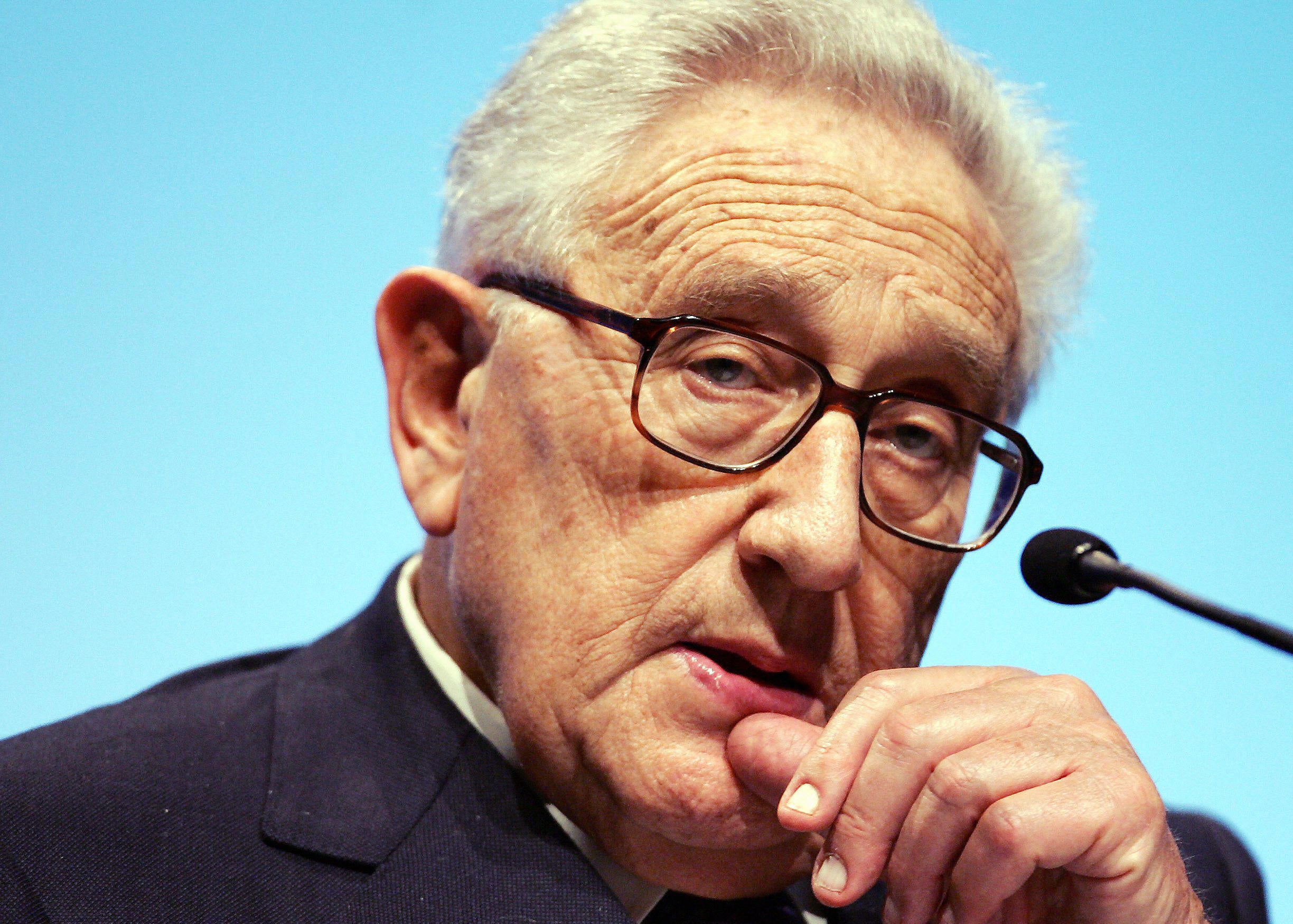
Long before he reached Washington, Henry Kissinger was a power in the land.
His achievements were intensely controversial, and he was harshly criticised from all sides; yet even his critics would not deny the reality of his successes and the exceptional nature of his reputation.
In 1973 he was awarded the Nobel Peace Prize. Yet for his actions in that same year in Cambodia and Chile, he was accused of being a war criminal and private prosecutions were begun.
He became a diplomatic superstar, and after the end of his public office in 1977 – at the extraordinarily young age of 54, as repeated attempts to return to public life all failed – he remained a legend.
As a consultant, he earned a fortune. As a celebrity in New York, he was always in demand, and head waiters always ushered him to the best tables. And despite the passing of the Cold War world which he had manipulated so brilliantly, he remained one of the towering personalities in the world of international relations.
He was born Heinz Alfred Kissinger in Fuerth, Bavaria, in 1923 into a Jewish family. As a boy, Kissinger experienced persecution; more than once he was roughed up by antisemitic youths.
In 1938, he and his father, mother and brother emigrated to New York, where they already had relatives. At least 13 close members of his family died in concentration camps.
Henry Kissinger, as he became in America, attended George Washington High School in Washington Heights.
He then attended City College, an institution through which many brilliant Jewish students passed at a time when Columbia and other prestigious universities still limited the number of Jewish people. He was planning to become an accountant when, in 1943, he was called up by the US army.
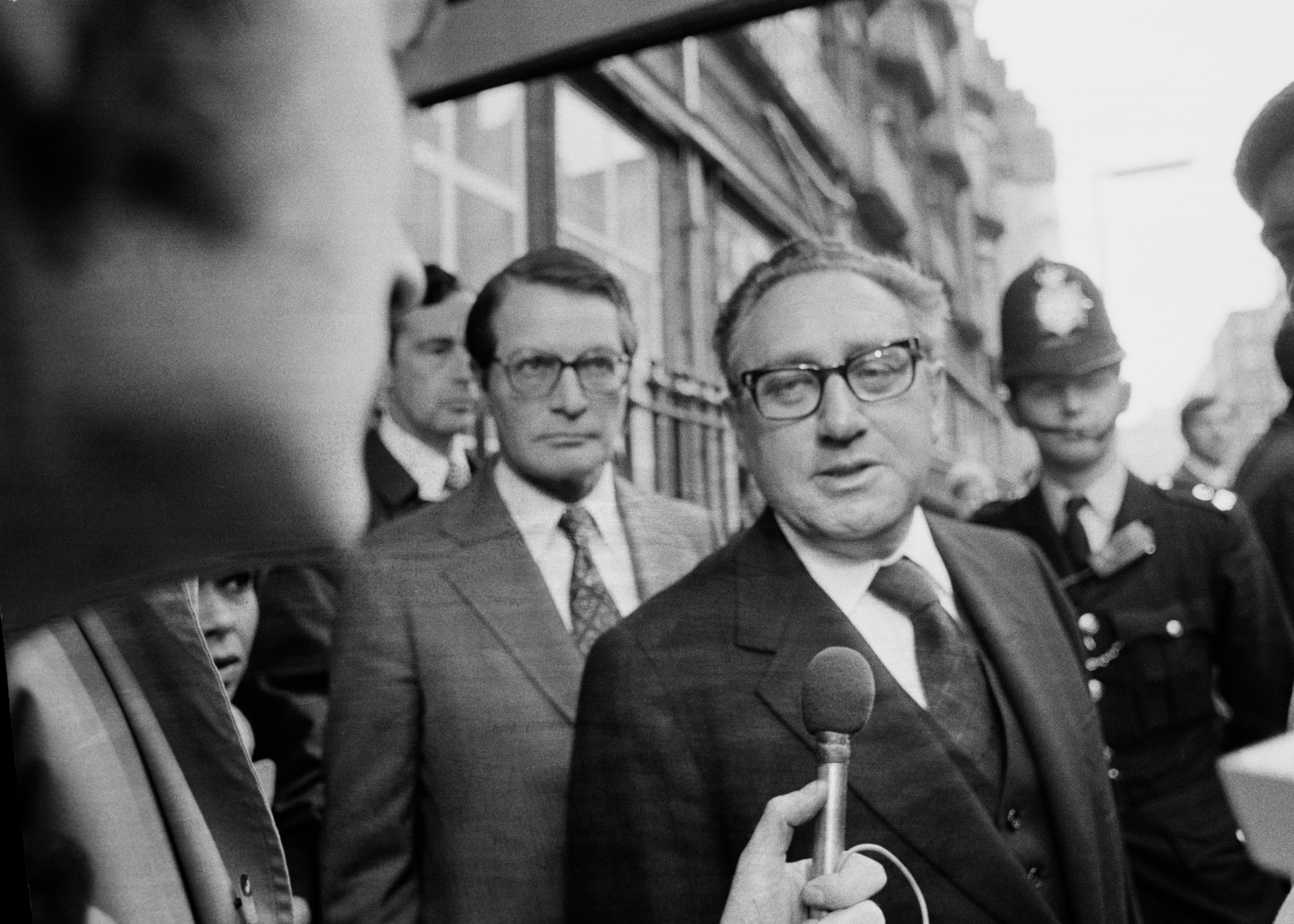
As a private in the army, Kissinger encountered an older private, Fritz Kraemer, the monocled son of a Prussian state prosecutor.
Kraemer was to be the first of a series of powerful and worldly father figures to whom Kissinger attached himself. Kraemer rescued young Kissinger from the rank and file of the army and got him into counterintelligence; he also convinced his protege of the need to go back to college.
Kissinger applied to Columbia, Princeton and Harvard and went to Harvard because it was the only college willing to take him straight away. In his second year there he married Anneliese Fleischer, known as Ann, who helped him greatly in his Harvard years and they had two children. They separated in 1962 and were divorced in 1964.
He received his PhD in 1954 and joined the Harvard government department, first as an instructor and later as a professor and, from 1959 to 1969, director of the Defence Studies Programme.
From 1955 on, he became a consultant to various government agencies in Washington, but the big prize – a staff job in the national security staff under John F Kennedy’s assistant, McGeorge Bundy – eluded him.
However, he had come under the patronage of a figure who promised to be more powerful than Bundy and who aspired to succeed Kennedy as president: Nelson Rockefeller.
It therefore came as a stunning surprise to observers when, in the summer of 1968, Kissinger secretly transferred his allegiance from Rockefeller, with whom he had worked for 12 years, to the newly nominated Republican presidential candidate, Richard Nixon.
Kissinger moved swiftly to assert his authority as national security adviser. Even while Nixon’s inauguration ceremonies were taking place, Kissinger distributed memoranda establishing a new administrative system that would concentrate more power in his hands than any of his predecessors had enjoyed, and correspondingly reduced the authority of his nominal superiors.
It was, one of his colleagues later said, a bureaucratic coup d’etat. Kissinger also established, through a mixture of audacious flattery, ruthless cutting-out of all potential rivals and sheer hard work and ability, a close if reciprocally mistrustful relationship with his president.
To this day, experts argue over how much of the credit for the achievements, and how much of the blame for the mistakes and the crimes, of the Nixon administration should go to the president, and how much to his national security adviser.
By far the most important and dangerous issue facing Nixon and Kennedy in January 1969 was the Vietnam war. The South Vietnamese governments supported by Kennedy and Johnson proved to be neither democratic nor effective in fighting the communist insurrection of the southern Viet Cong.
Nixon and Kissinger privately took the view that the war could not be won but that the American people would harshly punish any administration that admitted as much.
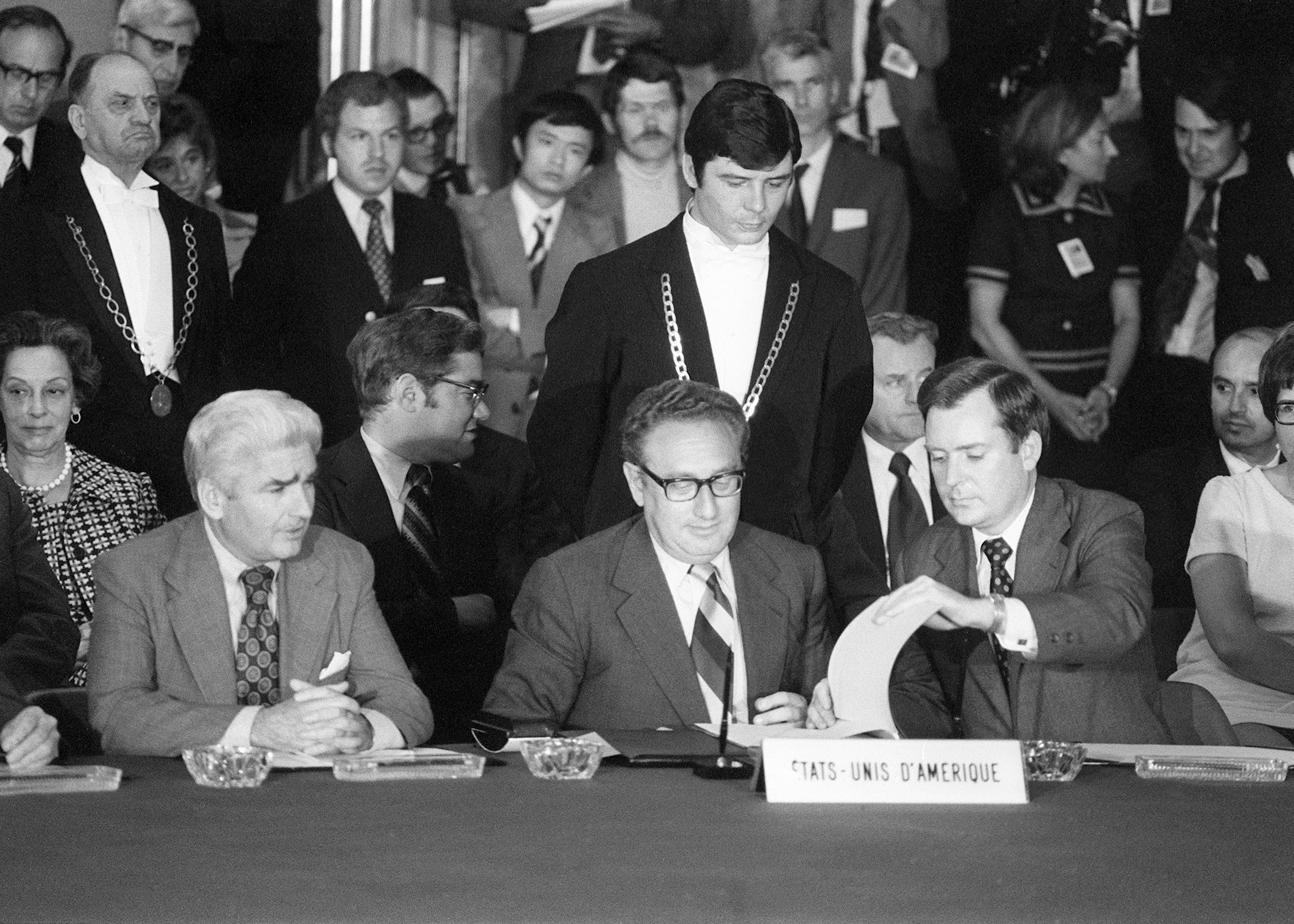
They crafted a subtle and complex strategy for extricating the US as far as possible from a war that had already bitterly divided American opinion (and forced Johnson, in effect, to abdicate) and looked all too much like an impending disaster.
There were three chief components to this grand strategy. The first was the “Vietnamisation” of the war. Second, and secretly, the US would continue to apply pressure outside Vietnam, by clandestine irruptions into Laos and Cambodia and, if necessary, the North, and by air raids on these territories. And finally, Kissinger would mount a vast, partially secret diplomatic operation to isolate North Vietnam from its own military and diplomatic backers in Moscow and Beijing.
The first two elements of this plan were disastrously unsuccessful. The third has had enormous, perhaps unintended but in the main highly advantageous consequences, both for the US and for Kissinger’s reputation.
Vietnamisation was a failure. For one thing, the South Vietnamese military and government never looked like developing the political legitimacy required to win, and in fact, they collapsed swiftly when American troops and air power were withdrawn.
Secondly, the process was necessarily secretive, and it gradually engaged the Nixon administration on a course of deception, lying and, finally, those paranoid, and illegal, activities which came to be lumped together after Watergate.
It was claimed at the time that Kissinger himself was not implicated. “Thank God,” people said at Washington dinner parties, “Henry’s not involved!” But of course, he was. It was Kissinger, for example, who ordered illegal wiretaps on 17 people in Washington, including some of his own subordinates and close friends.
And his was plainly the motivating personality behind the illegal, and disgraceful, burglary at the offices of a psychiatrist treating Daniel Ellsberg, who was responsible for the publication of the Pentagon Papers.
What can be said in Kissinger’s defence is that the atmosphere of Washington since the rise of the peace movement in the last years of the Johnson administration was one of poisonous suspicion; and that no one was more given to conspiracy theory and black paranoia than Kissinger’s master, Nixon.
By April 1970, the Soviet Union was already producing proposals for a strategic arms limitation treaty (Salt), and by May 1972, Nixon was able to travel to Moscow to sign agreements that accepted limitations on the two superpowers’ strategic arms production, one of them an agreement that each side would build no more than two anti-ballistic missile systems. It was a stunning diplomatic coup, achieved by Kissinger’s secretiveness and his ultimate indifference to ideological loyalty.
As early as August 1969, Kissinger set a precedent for clandestine personal diplomacy. In that month, he slipped away from a presidential visit to the Pacific to fly secretly to Paris where he met North Vietnamese negotiators.
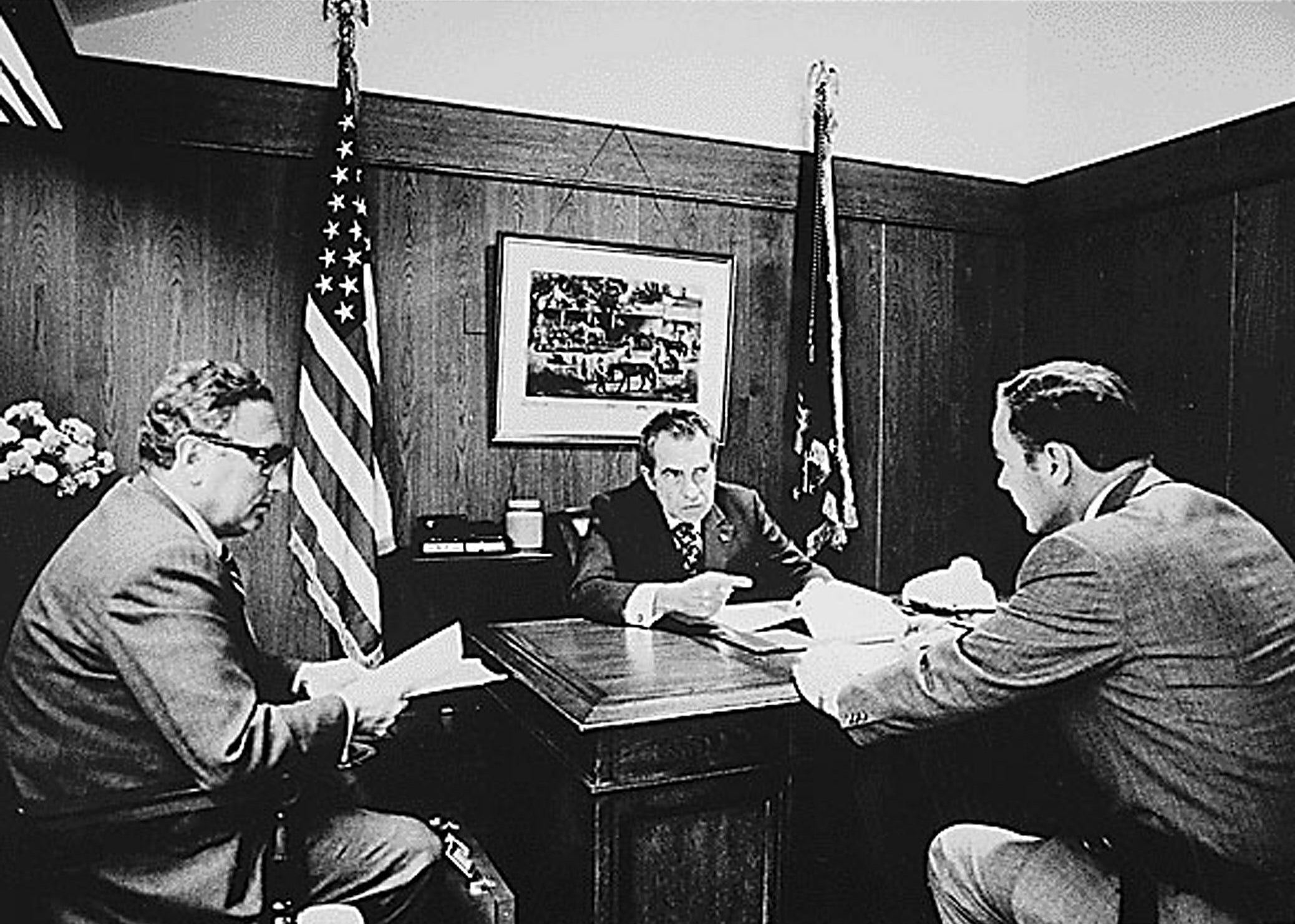
In July 1971, spiriting himself away from a visit to Pakistan under cover of a fake motorcade and misleading press announcements, Kissinger flew to Peking, where he met Zhou Enlai, the Chinese prime minister, and set off the train of diplomatic exchanges that would lead in February 1972 to one of the diplomatic shocks of the century: Nixon’s visit to China and the reopening of diplomatic relations between the People’s Republic and its former arch-enemy.
In the summer of 1972, the president and his national security adviser seemed to stand on top of the world. Asked by a reporter what he would do for an encore, Kissinger replied: “Make peace in Vietnam.”
That proved harder than he made it sound. South Vietnam’s President Thieu was understandably nervous about being abandoned by his American allies, and it was not until after the 1972 election that a breakthrough took place in peace negotiations.
When it came, it amounted to a decision on the part of the US, and Kissinger, to wash their hands of their South Vietnamese allies. Kissinger hoped for a decent interval before North Vietnam took over in the South but, in the event, the interval was barely decent. The war was over only two years later, in 1975.
On 21 September 1973, Kissinger was confirmed as secretary of state – the first foreign-born citizen to hold that high office. He had been the head of American diplomacy in all but name for years, in part because of his sheer ability at making himself indispensable to Nixon, who wrote to him in January 1971: “Frankly, I cannot imagine what the government would be like without you.”
Kissinger was far more at home in the diplomatic main event between the US and its two rival superpowers of that time, the Soviet Union and China, than he was in the smaller conflicts he felt called upon to deal with in the developing world.
His handling of the secession of Bangladesh from Pakistan led to an exodus of millions of refugees, a cholera epidemic and a war between India and Pakistan. His bombing of Cambodia, a casual consequence of his Vietnam policy, killed three-quarters of a million and in the opinion of many led directly to the appalling atrocities of the Pol Pot regime.
He masterminded the overthrow of the socialist Allende government in Chile in 1973 in a bloody coup. And he stumbled in handling both the Portuguese revolution of 1974 and the invasion of Cyprus by Turkey in the same year.
By 1973, both Kissinger and the US had been distracted from the endgame in southeast Asia by more exciting events at home and in the Middle East. By the spring of 1973, the televised revelations of the Watergate affair obsessed Washington and the nation, and a fuse was burning which would end in August 1974 with Nixon’s forced resignation, under the threat of almost certain impeachment.
Kissinger insisted that he had nothing to do with the dirty tricks and political shenanigans of Watergate, but his disclaimers cannot be taken entirely at face value.
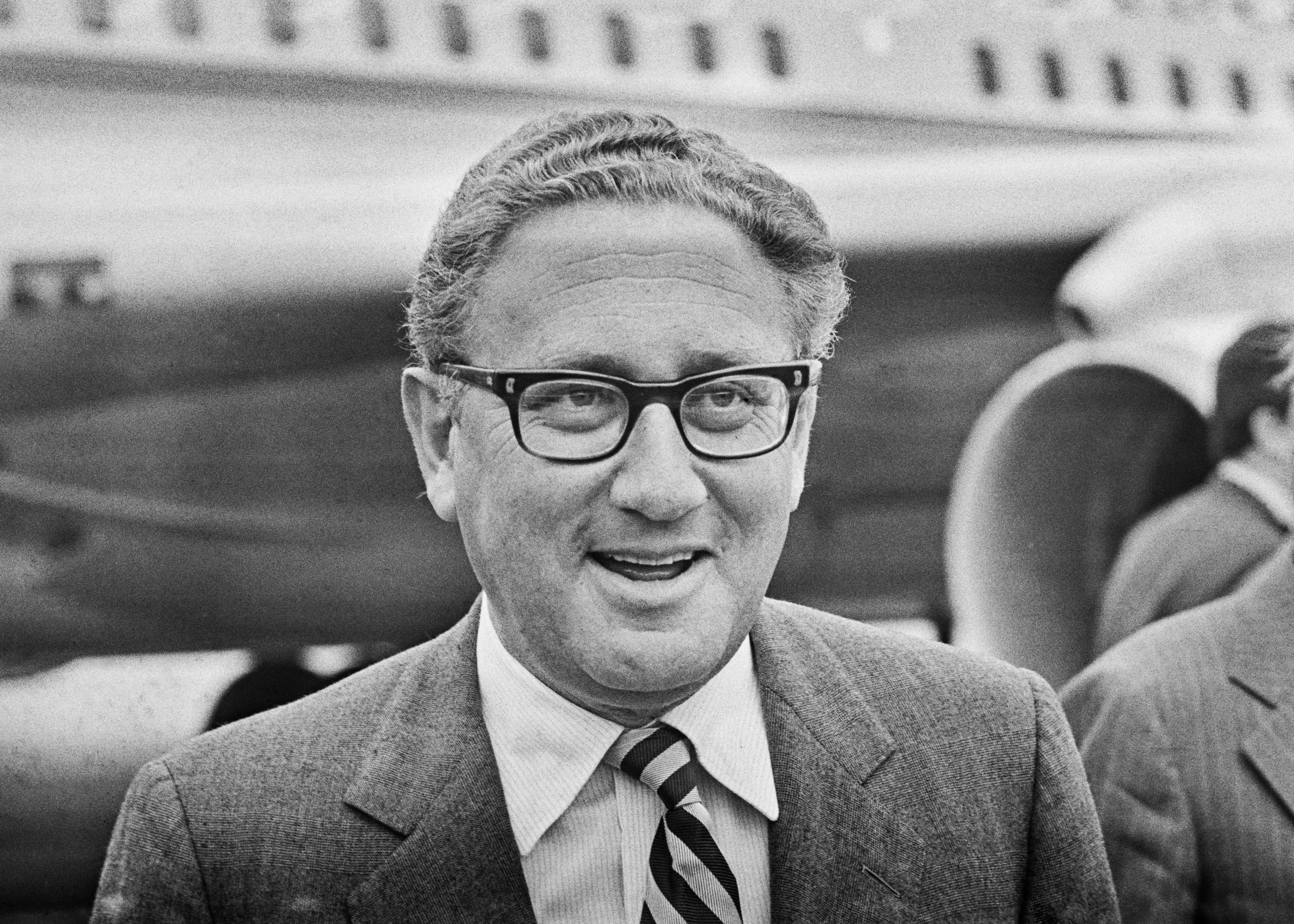
Before the Watergate crisis had run its course, however, Kissinger’s abilities were to be tested by a new crisis in the Middle East, an area where, as a Jewish American, he initially felt unsure of himself, not least because of Nixon’s antisemitism.
Over the next two years, Kissinger wanted greatly to increase both US influence there and the US stake in the Arab-Israeli peace process. After the Geneva conference of December 1973, he spent most of his time for the next two years in Middle East diplomacy, acquiring a reputation for the wisdom but also the deviousness of the serpent.
His virtuosity culminated in the famous “shuttle diplomacy” of 1974 in which he doggedly travelled between Egypt, Syria and Israel, forwarding the possibility of direct diplomacy by the subtlest of indirection.
This was perhaps his finest hour. When Gerald Ford replaced Nixon as president, one of his first acts was to retain Kissinger as his secretary of state. The Ford years, however, were not to be as brilliant a period for Kissinger as his years with Nixon. The world climate was changing.
After the first oil shock of 1973 international economic relations became more and more important, and Kissinger himself accepted that he was less sure in his handling of economic affairs than of classical diplomacy.
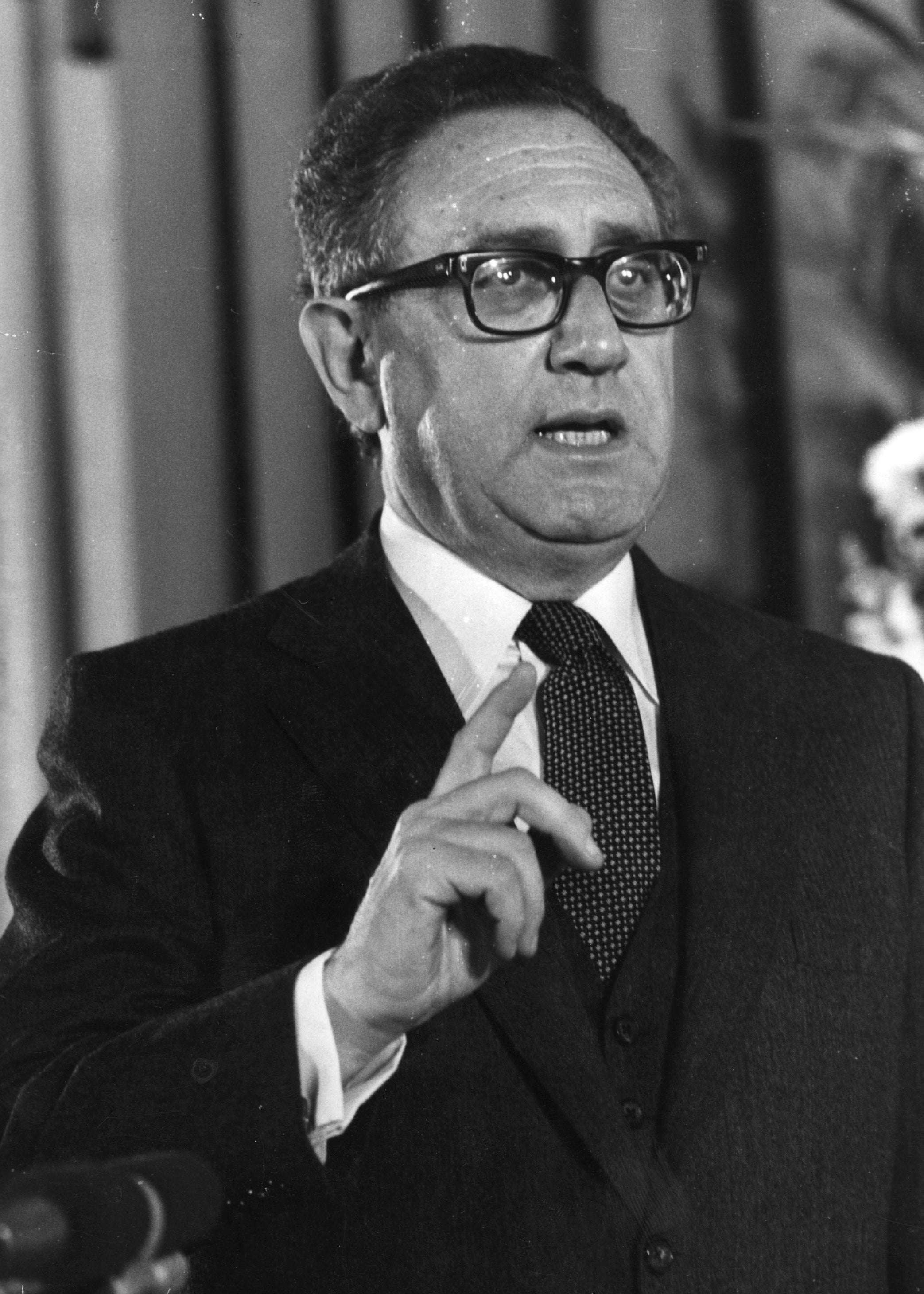
His great reputation under Nixon was based on his handling of an intricate, sometimes self-contradictory policy towards southeast Asia, and his success in moving towards detente with the Soviet Union and China.
The improvement in relations with China continued. But by the middle of 1975, the regime Kissinger had hoped to prop up in Saigon had finally collapsed. And in 1976 detente seemed to be going out of fashion.
In November 1974, Kissinger accompanied President Ford for a summit meeting with Russian president Leonid Brezhnev. No treaty could be agreed, however, and as the US moved into another election year, the prospects for a Salt II strategic arms pact were quietly shelved.
In his remaining months as secretary of state, Kissinger involved himself in the negotiations for black majority rule in Southern Rhodesia, but with a notably less sure touch than in his Middle East “shuttle”. When he left office, he had visited 57 countries.
After Ford was defeated by Jimmy Carter, Kissinger appeared not to be fully reconciled to private life, which was natural enough given that he was still only 54 years old, and on several occasions he let it be known he would be available for high office.
However, he soon settled down to a pleasant and notably prosperous life in New York. For an advance reported to be $5m, he wrote two volumes of autobiography, full of fascinating insights drawn from his extraordinary knowledge of the theory and practice of international relations, but marred by occasional disingenuousness in his efforts to exculpate himself over the campaigns in southeast Asia, the wiretapping of colleagues, and similar episodes.
In the 1970s and 1980s, he and his second wife, Nancy Maginnes, became popular diners in a New York set that included journalists, television executives and personalities from the worlds of fashion and entertainment more than politicians, foreign policy experts or academics. They entertained in great style in their Manhattan apartment, overlooking the East River, and Kissinger also bought an estate in Connecticut.
As a Harvard professor, Kissinger had already mastered the art of publicising himself. As Nixon’s adviser, he played the many keyboards of the great organ of the world’s media like a virtuoso.
And in his long and wastefully premature retirement, he remained a star in part because he worked so hard at being one. There were strands of cynicism and also of pessimism in his personality which friends attributed, perhaps correctly, to his experience of antisemitism as a child and an adolescent and to the numbing knowledge of the crimes committed against the Jewish people.
Whatever the explanation, there was a black side to his personality. He was capable of extreme manipulativeness and equivocation. He was intensively competitive and envious towards colleagues and rivals.
His worldview was pessimistic, and he saw the relations between nations much as his early role models, the princes Metternich or Bismarck, might have done. He had little patience for the weak, and introduced into American policy a jarring note of realpolitik.
Late in his life, he had the disagreeable experience of being accused, by the British journalist Christopher Hitchens and others, of war crimes. When he was asked by George W Bush after 9/11 to act as his adviser, he had to decline as it was not clear that he could travel abroad, not even to his beloved Claridge’s hotel in London, without being arrested and charged as a war criminal, like his former protege, General Pinochet.
Despite all his faults, he will be remembered as one of the greatest American diplomats and indeed as the man who made American diplomacy respected worldwide.
His intelligence, his energy, his patience (despite a volcanic temper), his ability to play the game of nations on several boards at once, and above all his armoury of skills as a negotiator, made him a dazzling star of his time, even though the world he manipulated so brilliantly was to be destroyed forever, after he had left the stage but before he had left the theatre, by the collapse of the Soviet Union.
Henry Kissinger, former US secretary of state, politician and diplomat; born 27 May 1923, died 29 November 2023
Godfrey Hodgson was an English journalist and historian who covered and studied American politics and civil society. He died on 27 January 2021